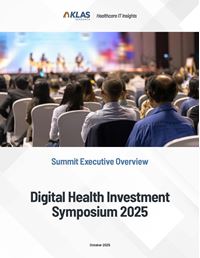

DHIS 2023
In September 2023, KLAS hosted the seventh annual Digital Health Investment Symposium (DHIS)—about 200 executive thought leaders and representatives from healthcare organizations, HIT companies, and investment firms attended this strategic retreat to collaborate on important healthcare developments, with a specific focus on the tradeoffs between platforms and point solutions in the healthcare technology stack. This event overview shares insights from the event’s small-group discussions, especially highlighting the pressing challenges of the healthcare technology stack, staffing shortages, and AI.
The Pre-Summit Survey
KLAS conducted a pre-summit survey that was developed based on observations of the HIT industry and conversations with healthcare thought leaders. The survey questions focused on (1) the impact of current staffing issues, (2) healthcare friction points, including with the tech stack, and (3) perspectives on AI.

Optimism among Healthcare Organizations Is High Despite Continuing Pain from Staffing Shortages
Staffing shortages (an important topic from DHIS 2022) and other challenges have continued to affect healthcare organizations over the last year. Even so, at least half of all responding investors, HIT vendors, and provider organizations report an optimistic outlook for the healthcare market over the next year. Among respondent types, HIT vendors most often report a positive future outlook, with 72% citing varying levels of optimism; provider organizations are also relatively optimistic, with 55% saying they feel somewhat optimistic. Across attendee types, those who expressed pessimism noted challenges with increased demands for healthcare, a decreased workforce, and frustration with payers.

Staffing Pressures Are Driving Energy in AI, Automation, and Tech Stack Consolidation
While optimism largely remains high, provider organizations still report pervasive challenges, particularly with staffing. Many are seeking opportunities to reduce costs and increase efficiencies; thus, consolidation is top of mind for organizations evaluating their budgets, and energy is high around solutions and technology like AI and automation that can increase efficiency.
1. Staffing: Many HIT vendors and investors are returning to their pre-pandemic levels of hiring and maintaining staff; all HIT vendor and investor respondents indicated their staffing challenges have at least remained the same compared to last year, with 25% even noting an increased ability to attract and retain talent. On the other hand, provider organizations are still experiencing staffing problems—over half reported increased staffing challenges over the last year.
2. Healthcare tech stack: Over the last decade, provider organizations have worked to keep up with the proliferation of new healthcare technology solutions. Today, provider organizations are increasingly consolidating their tech stack, looking to either their EHR vendor or another existing vendor partner before considering point solutions. Many survey respondents feel point solutions are competitive in highly specialized or niche areas. Even still, almost all respondents indicate that point solutions need to be interoperable to be competitive.
3. AI: The public launch of generative AI tools has created a resurgence of interest in how AI can help healthcare. Respondents most frequently cited AI as the area in healthcare with the potential for most growth over the next year. Even with that consensus, respondents showed a great diversity of thought when asked about the specific use cases they were excited to see with AI—responses included a wide range of possibilities, such as predictive analytics, clinical documentation, scheduling, ambient speech, and patient engagement.


Summit Discussions
At the summit, small groups comprising various types of attendees discussed the central themes identified in the pre-summit survey. They noted that today’s vendors should be cognizant of their solution’s place in the tech stack and redouble their focus on both robust integrations and frictionless user experiences. As staffing continues to be a major pain point, technology solutions will need to focus on efficiency and outcomes without creating additional staffing overhead or obstacles to providing care. AI in particular holds great promise here but simultaneously poses many risks and challenges to healthcare systems looking to adopt. Development in this space needs to focus on transparency, both for the solution and for the strategy and governance of the customer. Below are takeaways from the small-group discussions.
 Staffing Challenges Remain High but Can Be Aided by Technology Solutions
Staffing Challenges Remain High but Can Be Aided by Technology Solutions
- Staffing and labor shortages have been a major driver of financial pressures for provider organizations in the last year. Many are accepting the new reality of low staff levels and are looking to alternative strategies to do more work with fewer people. Entry-level positions have been particularly difficult to fill, with some organizations outsourcing their revenue cycle management to mitigate some of the staffing pains.
- Functionality for scheduling and capacity planning in healthcare has fallen behind compared to the functionality used in other industries; regulations and liability risks have slowed innovation.
- Any solution (platform, point solution, or AI) that allows staff to work to the top of their license will resonate with healthcare customers.
- HIT vendors can aid in retention at provider organizations by reducing the solution’s burden on staff. Vendors should strive to take a holistic approach to how their customers’ staff can interact with the solution, and ensure a frictionless, easy-to-use experience.
 The Healthcare Tech Stack: The Use Cases of Point Solutions and Platforms
The Healthcare Tech Stack: The Use Cases of Point Solutions and Platforms
- Integration is the primary consideration among provider organizations evaluating point solutions. However, compliance from the vendor providing the platform infrastructure (i.e., the EHR, ERP, or CRM solution) is necessary to ensure successful third-party integration.
- Provider organizations often first consider broad platforms to receive the benefits of integration, even at the risk of losing advanced functionality from other solutions. Still, organizations view the superior agility and focus of point solutions as major benefits over platforms. Attendants worry that some platform vendors may struggle to innovate quickly enough due to their broad priorities and service lines.
- All HIT vendors need to demonstrate ROI for both platform and point solutions. Provider organizations still don’t see a clear ROI or feel confident that solutions are being fully utilized.
 AI and Machine Learning Are Top of Mind but Being Approached with Caution
AI and Machine Learning Are Top of Mind but Being Approached with Caution
- In terms of AI, many attendees are worried for potential lawsuits. Keeping a human in the loop is important for mitigating liability but may create barriers to realizing efficiency outcomes.
- The transparent delineation of what is and isn’t considered AI is important. Transparency in the AI model and data is also critical for driving trust in the output.
- Attendees are not interested in AI tools that provide solutions to problems they don’t have or that disconnect the providers from the patients.
- The automation of a broken system results in a faster broken system. Change management is a critical component of lasting efficiencies for technology interventions.
- Data quality is still a major barrier to AI model deployment. AI deployment requires a relentless focus on data quality, as the data output is only going to be as good as the data input.
The Way Forward for Provider Organizations
Those in the healthcare industry have invested heavily in capital, technology, and time to create resiliency against the challenges that arise from staffing shortages, technology stacks, AI, and more. But underlying all of that is the need for strong change management. Technology cannot be beneficial until end users choose to adopt it and trust in changing workflows. Organizations need to invest in not only creating change management processes but also developing a strong organization-wide culture that allows for change; those who do so will be best positioned to leverage technology solutions to reach outcomes and ultimately improve patient care.
In our continued commitment to evaluating ongoing challenges in healthcare and uncovering compelling HIT use cases (including the practical applications of AI), DHIS 2024 will focus on how organizations leverage technology to build resilience against pivotal healthcare challenges, such as COVID-19, staffing shortages, financial strain, etc. To actively participate in the discussions and secure your attendance at DHIS 2024, contact your KLAS contact or email info@klasresearch.com.
Attendees
AAMI
Advent International
Advocate Health
AGS Health
Amenities Health
American Academy of Family Physicians
AMN Healthcare
Anatomy IT
Andor Health
Apax Partners
Arcadia
athenahealth
AtlantiCare
Bailey & Company
Bain & Company
Ballad Health; Ballad Ventures
Berkshire Partners
BESLER
Brigham and Women’s Hospital
Capital One
Caregility
CarePayment
CareRev
CareSimple
Caribou Medical Center
Carle Health
Cedar
Charlesbank Capital Partners
Chartis
Children’s Health
Children’s Hospital of Orange County
CHRISTUS Health
Clarify Health
ClearBalance Healthcare
Clearwater
Clemenceau Medical Center (affiliated with Johns Hopkins Medicine International)
Cleveland Clinic
CommonSpirit Health
Consensus Cloud Solutions
Contra Costa Health
CPSI
Crestline Investors
CSI Companies
Danaher Diagnostics
DeliverHealth
DHR Health
Ensemble Health Partners
Epic
Evergreen Healthcare Partners
First Health Advisory
Fisher-Titus Medical Center
Flexpoint Ford
Flywire
Fortified Health Security
Fulcrum Equity Partners
Gauge Capital
GE HealthCare
GMP Network
Gozio Health
Greenway Health
Gryphon Investors
GS Lab | GAVS Technologies
GTCR
Guidehouse
Health Catalyst
HDMgroup
Health Recovery Solutions
Healthcare Triangle
healthKERI
Healthlink Advisors
HealthQuest Capital
HealthTalk A.I.
HFMA
HonorHealth
Huron
Impact Advisors
Infinx Healthcare
Infor
Innovaccer
Intelerad
Intermountain Health
Intraprise Health
Iris Telehealth
JMI Equity
KKR
L.E.K. Consulting
LeanTaaS
LifeBridge Health
Longevity Health Plan
LRVHealth
Luma Health
Lumeon
Mach7 Technologies
Massachusetts General Hospital
Mass General Brigham
MD Anderson Cancer Center
Mercy Health
Millennia
N1 Health
Nautic Partners
New Mountain Capital
NextGen Healthcare
Norwest Venture Partners
Oak Hill Capital
ONC
OnPoint Healthcare Partners
Oracle Health (Cerner)
Parthenon Capital Partners
Penn Medicine
Philips
PointClickCare
PwC
Proscia
Providence
QGenda
R1 RCM
Rady Children’s Hospital - San Diego
Raymond James
RevSpring
The Riverside Company
Scripps Health
Sixth Street
Snowflake
SpringTide
SSM Partners
symplr
Tampa General Hospital
TeamBuilder
THL
Trinity Rehab Services
TriVent Healthcare
UCI Health
United Family Healthcare
University of Utah Health
Upfront Healthcare
Vestar Capital Partners
VisiQuate
Warburg Pincus
Waystar
WCAS
Workday
Zelis
Sponsors





Writer
Carlisa Cramer

Designer
Bronson Allgood

Project Manager
Sydney Toomer
This material is copyrighted. Any organization gaining unauthorized access to this report will be liable to compensate KLAS for the full retail price. Please see the KLAS DATA USE POLICY for information regarding use of this report. © 2026 KLAS Research, LLC. All Rights Reserved. NOTE: Performance scores may change significantly when including newly interviewed provider organizations, especially when added to a smaller sample size like in emerging markets with a small number of live clients. The findings presented are not meant to be conclusive data for an entire client base.









